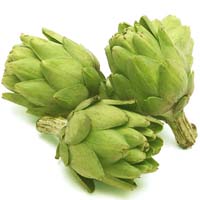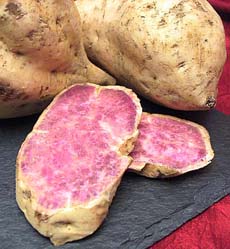 Want something new and exciting for dinner? Try these lavender Okinawa sweet potatoes...or the dozens of other exotic and heirloom vegetables we present for your consideration. Photo courtesy of Melissas.com. Want something new and exciting for dinner? Try these lavender Okinawa sweet potatoes...or the dozens of other exotic and heirloom vegetables we present for your consideration. Photo courtesy of Melissas.com.
|
ELIZABET TRAVIS is an Editorial Intern at THE NIBBLE.
|
|
July 2008 |
 |
Product Reviews / Main Nibbles / Vegetables
A Glossary Of Exotic & Heirloom Vegetables
Page 3: Exotic & Heirloom Artichoke & Asparagus Types
CAPSULE REPORT: This is Page 3 of a 15-page glossary of a glossary of exotic and heirloom vegetables. Click on the black links below to see other pages.
We’ll keep adding to this glossary as we find new types of artichoke and asparagus.
| Artichokes |
Get To Know Me |
Baby Artichoke
A smaller version of the globe artichoke, its size comes from its location on the lower parts of the plant. The plant fronds protect the globe and end up stunting its growth. Baby artichokes are picked when they are fully mature, unlike other baby vegetables, so they have the same flavor as the regular- size artichoke. All artichokes can be prepared many different ways: baked, sautéed, grilled, fried, boiled, steamed and microwaved.
Available year-round, but peak is March to May & September to November.
|
|
Globe Artichoke
A perennial thistle originating in southern Europe and around the Mediterranean, the artichoke is in fact an unopened edible flower bud. It is prized for its tender petals and sweet, delicate heart. The stem is removed before cooking, and lemon juice is most often squeezed on top to prevent a change in color from vibrant to dark green. The globe artichoke is large in size, making it good to stuff with breadcrumbs and other vegetables; but it is most often enjoyed steamed or boiled with lemon and drawn butter.
Available year-round. |
 |
Long Stem Artichoke
This artichoke is just as delicious as any other, but what makes it special is the edible stem and thick meat of the petals. To prepare the stem, one must first peel its extremely fibrous skin. Once cooked, the stem is an added treat that tastes similar in flavor to the heart.
Available March to May & July to August. |
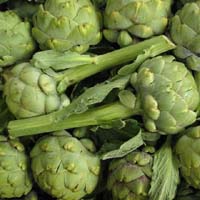 |
Purple Artichoke
While the purple artichoke is higher in nutritional value than its relatives, it is not nearly as tasty. The darkness of the leaves lends it a more bitter quality. It is often chosen for its beauty and used as border plants to decorate gardens.
Available year round. |
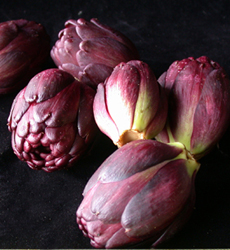
Available at ProduceHunter.com. |
| Asparagus |
Get To Know Me |
Purple Asparagus
Originating in Italy, purple asparagus has a much sweeter, more tender quality than its green counterpart, and a mild nutty flavor. It is perfect for salads, but can also be prepared steamed, baked or sautéed like green asparagus. It loses its exotic color and turns green when cooked too long.
Available almost year-round. |
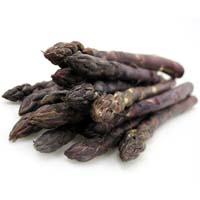 |
White Asparagus
Grown underground in mounds of sandy soil (or indoors) so that it doesn’t see light until harvested, white asparagus has a mild but slightly bitter flavor due to a lack of chlorophyll. It is also tougher than other asparagus, making it necessary to blanch or peel it before cooking. Otherwise, it can be prepared as any other variety.
Available year-round, but peak is April to July. |
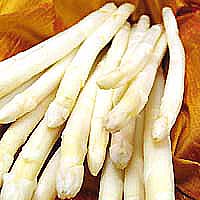 |
Continue To Page 4: Beets
Go To Article Index Above
© Copyright 2005-2026
Lifestyle Direct Direct, Inc. All rights reserved. Photos are courtesy Melissas.com except as noted. Images are the copyright of their respective owners.

|



